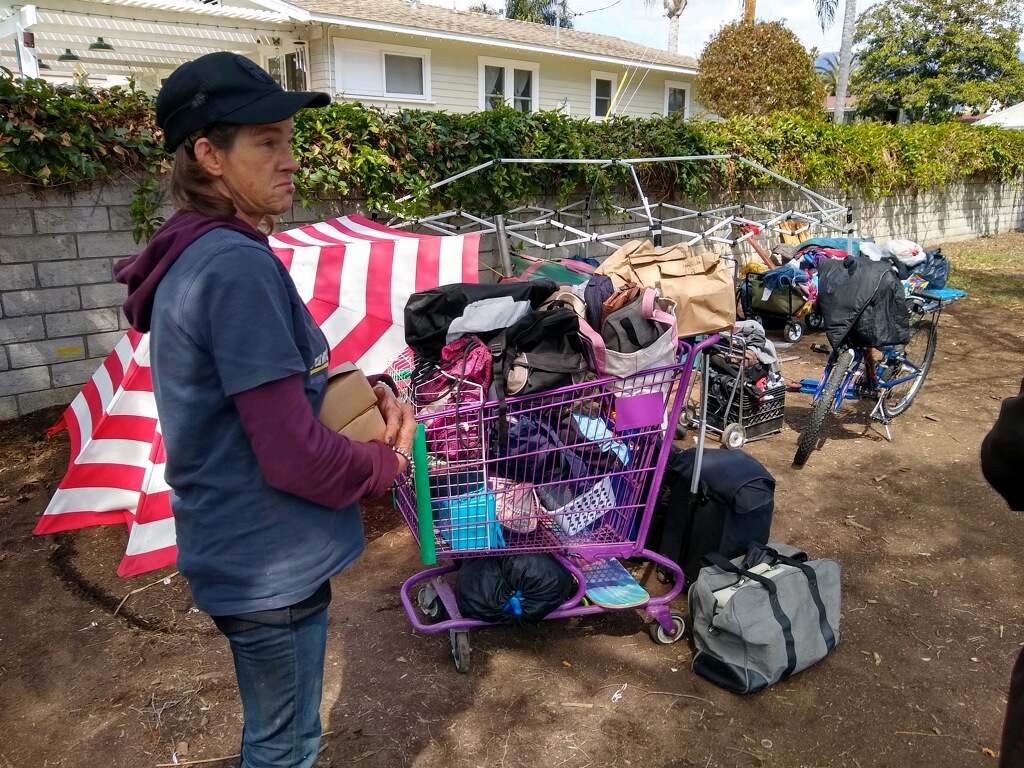Homeless Sweeps Target Pershing Park and Dwight Murphy Field Camps
City Officials Serve Eviction Notices as Homeless Rights Advocates Question the Legality of the Move

Santa Barbara city officials launched a sweep of three downtown homeless camps this Friday morning, two days after the South Coast was hit by a freak hail storm that left snow by the Arlington Theatre and a few hours before another smattering of rain began to descend.
The targets of the city’s action were the homeless encampments at Pershing Park and Dwight Murphy Field. In addition, officials cleared out at least one camp located on the steep hillsides above Loma Alta near City College. The sweeps reflect an improved public health prognosis with regard to COVID-19.
This marks a significant shift in policy. Up till now, local authorities have taken a strict hands-off approach about encampments, citing a directive from the Centers for Disease Control and Prevention urging they be left alone for public health reasons. To date, the CDC has not reversed that directive. But with the number of infections and hospitalizations declining and the number of vaccinations increasing, authorities in City Hall surmise it’s only a matter of time before Santa Barbara — like the rest of Santa Barbara County — transitions from the most restrictive purple tier to the more permissive red one.
Get the top stories in your inbox by signing up for our daily newsletter, Indy Today.
State health authorities have already green-lighted youth sports. That, in turn, has triggered officials within the city’s Parks and Recreation department — in conjunction with its environmental safety officer — to serve eviction notices on park occupants living in tents. No eviction notices were served on people living in their RVs. Parks and Rec intends to begin youth sport programs at Pershing Park this weekend.
In recent months, the number of people sleeping in tents at Pershing Park has grown dramatically, as has the number of complaints registered by nearly hotel and motel owners. Police reported the presence of human feces, syringes, and other drug paraphernalia at the site. They also have been called to break up fights and in response to theft complaints from nearby residents.
Homeless rights advocates questioned the legality of the sweeps given that the CDC’s injunction on disrupting homeless camps has not been lifted. Likewise, they questioned where those uprooted can or will go. Police told them they were free to go wherever they wanted. Outreach workers with CityNet ― hired by City Hall — have been blanketing these parks, soliciting people living in them to seek counseling services and take the steps necessary to obtain transitional housing. It remains uncertain how much housing actually exists, however, or if there’s enough to meet the number of outdoor campers thus displaced. Given the shortage of shelter space currently available and the threat of more inclement weather on the horizon, the timing is less than fortuitous.
Councilmember Michael Jordan — whose district includes Pershing Park — expressed frustration that he was not notified via the normal chain of command of the city’s actions. He would only find out by attending a group Zoom chat hosted by SB-ACT, an organization seeking to better coordinate the many organizations currently attempting to transition homeless people off the streets. He expressed concern about evicting so many people after having allowed them to congregate in such large numbers in the first place. And without adequate short-term shelter space in the hopper, he suggested the problems afflicting the Pershing Park neighborhood will now be visited on other parts of the city.
City Attorney Ariel Calonne stressed that the eviction actions involve only park spaces where active recreational programs will take place.

Among those evicted was Patrick Draper, otherwise known as Chopper. Draper — a former chef at Gelson’s and an avid musician ― has been on the streets since 2014. He praised the generosity of neighbors living nearby, not to mention that of many nonprofits that have kept residents of the park fed, clothed, and showered. Draper wound up at Pershing Park, he said, after authorities rousted people pitching tents near East Beach.
At Pershing Park, Draper — a second-degree black belt ― attempted to play the role of sheriff and keeper of the peace. “We try to regulate the behavior,” he said, acknowledging there’s been some behavior to regulate: screaming, shouting, and violence. But some of the problems, he suggested, were caused by circumstances beyond the occupants’ control. With one porta-potty for 70 people and no fresh water to wash one’s dishes, sewage issues were inevitable.
Until Friday, Draper occupied an older van inscribed with the word “Chop.” From the outside, it appeared to be the center of gravity for a vortex of old bicycles, furniture, and people. Although the eviction orders did not target people living in vans, Draper said the time had come to vacate the premises. He will leave the van behind. Now might be a good time, he said, to get back on the rehab wagon. Over the years, Draper said he’s had his ups and downs with drugs and alcohol. He’s also worked as a rehab counselor. “I love to pull people out of the bushes,” he said. “You never know who’s going to stay sober. And you never know who might become your next sponsor.”
Elizabeth Weiss wanted to be an architect in third grade. It shows. There’s a grab-bag ingenuity to how she assembled a hodge-podge of beach umbrellas, tent materials, and silver-faced insulation material to craft a home along the parking-lot fence near the entrance of Pershing Park. Weiss put up no resistance as city police executed the eviction orders; nor did she attempt to take the shell she fabricated with her. Instead, she packed up her belongings — and her bicycle — in a pinkish-purple shopping cart and headed off for a new site.
At the time of her departure, Weiss was uncertain where she might go. Before washing up at Pershing Park, she spent the previous six months at East Beach. She described her space at Pershing Park as “prime location.” Some of her neighbors, she said, could get “a little rambunctious,” adding, “and I probably was myself.”
Before landing in Santa Barbara, Weiss said she lived in Las Vegas. She moved to Santa Barbara, she explained, “because I didn’t want to die in Las Vegas.”




You must be logged in to post a comment.